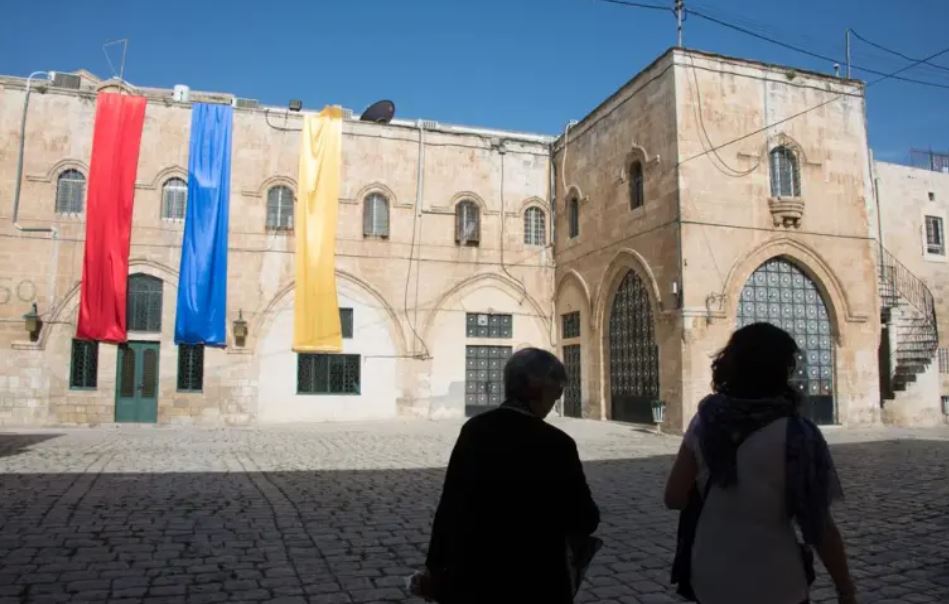by The Armenian Mirror-Spectator
By Israel W. Charny
Clearly, our hearts and minds are deeply concerned with the murdering hells of war crimes or crimes against humanity — that in my professional language as a genocide scholar are one of the several subtypes of genocide — that Putin’s Russia is committing. But at the same time, some of our attention deserves to be saved for the issues of other peoples’ welfare as well, and that includes the ways we extend respect to past events of genocide, such as the Armenian Genocide, whose official day of remembrance is April 24. (This was the day in 1915 the Turks rounded up some 250 leaders of every aspect of Armenian culture and executed almost all of them.)
Quite obviously, Israel has been refraining these many years from officially recognizing the Armenian Genocide out of an effort not to excite the fury and retaliation of Turkey. The Turks have persisted in their bizarre denials of the factual history of the Armenian Genocide through all these years, and are known to have devoted literally millions of dollars to campaigns of censorship and cancellations of reports, articles, books, professional congresses, art exhibits, and even musical events that in one way or another were intended to express pain and caring about the Armenian Genocide.
Read also

Prof. Israel Charny
In Turkey, an easy one-way ticket to jail has been to bring up the subject of the Armenian Genocide prominently — although strangely there also grew a generation of brave intellectuals and artists who managed to get across the memory of the slaughter of the Armenian people and survived, though a good many of them had to go through painful legal trials of charges of insulting the government, and the ones who survived came at the expense of periods of being in jail. Obviously, the Turks took the subject terribly seriously. One might say that it was the Turkish version of the American taboo of cussing the other guy’s mother — in the age when to say that to a good old American marine was an established one-way ticket for getting yourself slugged — in Turkey you went to jail if you talked of a genocide.
So, big grown-up countries — like the United States and I think Israel deserves to be characterized in this way, too — have been scared from getting involved with Turkish sensitivity. Writing in the Times of Israel, Lazar Berman notes, “Many countries have refrained from recognizing the genocide out of fear of the Turkish response, which often involves recalling its ambassador for a period of time. That was Ankara’s reaction in 2011 when the French National Assembly passed a bill making it illegal to deny the Armenian Genocide. It also recalled its ambassador to the Vatican when Pope Francis used the word genocide during a 2015 mass marking the 100th anniversary of the slaughter, and its ambassador to Germany after the Bundestag passed a resolution calling the murder of Armenians a genocide in 2016.”
Happily, author Berman nonetheless was of the opinion that Turkey likely would not take any steps against the US for its recognition, and that has proven to be the case. In fact, even in earlier years when Turkey was far less stressed, economically and politically, than it is today, its characteristic modus operandi has been to react with a torrent of invectives and threats, including concrete announcements that it would cancel major economic relationships, and in some cases seemed to go about implementing their threatened repercussions, but then, quite consistently, withdrew from retaliating and resumed essentially complete relationships.
Israel is a country that takes special pride in not being afraid, and of standing up proudly and firmly against huge Samson-like antagonists. It has been humiliating and puzzling that in a matter of basic ethics and factual truth, Israel has been so meek, obsequious and fawning that it has failed to extend the simple honor of recognizing another people’s suffering and destruction in a massive genocide. Is it so beyond our imagination as Israelis to be able to say to Turkey at this time, “We have every respect for you as an important country and are happy to work closely with you, but we owe our own culture the clear cut responsibility to identify with a people whose historical record — confirmed by an overwhelming number of scholars all over the world — shows that they were subject to governmental extermination. The truth is that this is a universal problem for all of mankind, and as Germany has shown in its greatness, it is possible to acknowledge genocide in one’s history and go on to contribute to building better lives for one’s own people and other peoples.”
Will we not feel prouder and stronger if we speak that way?
Insofar as Israel still fears the Turkish response, it has an unusual opportunity to recognize the Armenian Genocide under the umbrella of the first anniversary of American recognition. The linking of Israel’s recognition of the Armenian Genocide to the recognition by the US on the same day, April 24, which is designated as the start of the Armenian Genocide, will also provide an additional layer of defense for Israel, since any retaliation against Israel will also take on a meaning of being an attack on the US, as well. As President Joe Biden said, “Each year on this day, we remember the lives of all those who died in the Ottoman-era Armenian Genocide and recommit ourselves to preventing such an atrocity from ever occurring again… the American people honor all those Armenians who perished in the genocide.”
(Israel Charny has directed the Institute on the Holocaust and Genocide in Jerusalem since the famous conference on the Holocaust and genocides of all nations in 1982, which took place despite fierce opposition from the Israeli Foreign Ministry and Turkey. Recently, his book was published in the US: Israel’s Failed Response to the Armenian Genocide. In the early 1990’s he was one of the founders and a president of the International Association of Genocide Scholars. This opinion piece originally appeared on the Jerusalem Post website on April 5.)





















































